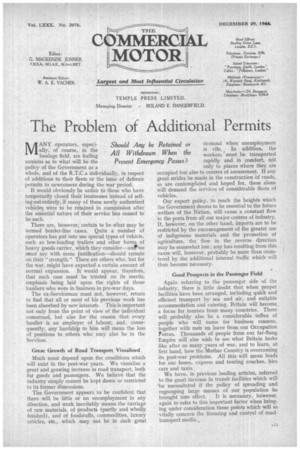The Problem of Additional Permits
Page 17

If you've noticed an error in this article please click here to report it so we can fix it.
Should Any b e Retained or All Withdra ten When the Present Emer gency Passes?
MANY operators, especially, of course, in the haulage field, are feeling anxious as to what will be the policy of the Government as a whole, and of the R.T.C.s individually, in respect of additions to their fleets or the issue of defence permits to newcomers during the war period. It would obviously be unfair to those who have temporarily closed their businesses instead of selling out entirely, if many of these newly authorized vehicles were to be retained in commission after the essential nature of their service has ceased to be such.
There are, however, certain to be what may be termed border-line cases. Quite a number of operators has put into use special types of vehicle, such as low-loading trailers and other forms of heavy goods carrier, which they consider—anewe must say with some justification—should remain On their "strength." There are others who, but for the war, might have expected a certain amount of normal expansion. It would appear, therefore, that each case must be treated on its merits, emphasis being laid upon the rights of those hauliers who were in business in pre-war days. The ex-Serviceman must not, however, return to find that all or most of his previous work has been absorbed by new interests. This is important not only from the point of view of the individual concerned, but also for the reason that every haulier is an employer. of labour, and, consequently, any hardship to him will mean the loss of positions to others who may also be in the Services.
Great Growth of Road Transport Visualized Much must depend upon the conditions which will exist in the post-war years. We visualize a great and growing increase in road transport, both for goods and passengers. We believe that the industry simply cannot be kept down or restricted to its former dimensions.
The Government appears to be confident that there will be little or no unemployment in any direction, and work inevitably means the carriage of raw materials, of products (partly and wholly finished), and of foodstuffs, commodities, luxury articles, etc., which may not be in inch great demand when unemployment is rife.. In addition, the workers must be transported rapidly and in comfort, not only to places where they are occupied but also to centres of amusement. If any great strides be made in the construction -of roads, as are contemplated and hoped for, these alone will demand the services of considerable fleets of vehicles.
Our export policy, to reach the heights which the Government deems to be essential to the future • welfare of the Nation, will cause a constant flow to the ports from all our major centres of industry. If, however, on the other hand, imports are to be restricted by the encouragement of the greater use of indigenous materials and the promotion of agriculture, the flow in the reverse direction may be somewhat less ; any loss resulting from this cause will, however, probably be more than countered by the additional internal traffic which will then become necessary.
Good Prospects in the Passenger Field Again referring to the passenger side of the industry, there is little doubt that when proper facilities have been arranged, including quick and efficient transport by sea and air, and suitable accommodation and catering, Britain will become. a focus for tourists from many countries. There will probably also be a considerable influx of people who will come for business reasons, together with men on leave from our Occupation Porces. Thousands of people from our far-flung Empire will also wish to see what Britain looks like after so many years of war, and to learn, at first hand, how the Mother Country is overcoming its post-war problems. All this will mean loads for our buses, express and touring coaches, hire cars and taxis., We have, in previous leading articles, referred to the great increase in transit facilities which will be necessitated if the polity of spreading and regrouping large masses of our population be brought into effect. It is necessary, however, again to refer to this important factor when bringing under consideration those points which will so vitally concern the licensing and control of roadtransport media..




















































